论英语中的性别歧视现象及其消除方法
试述英语语言中的性别歧视现象
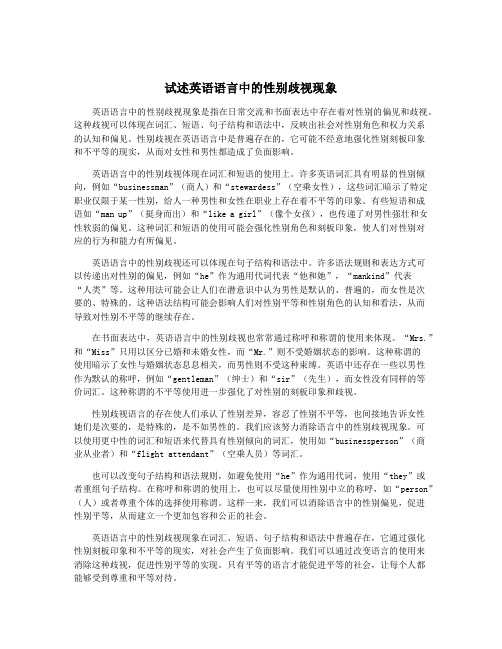
试述英语语言中的性别歧视现象英语语言中的性别歧视现象是指在日常交流和书面表达中存在着对性别的偏见和歧视。
这种歧视可以体现在词汇、短语、句子结构和语法中,反映出社会对性别角色和权力关系的认知和偏见。
性别歧视在英语语言中是普遍存在的,它可能不经意地强化性别刻板印象和不平等的现实,从而对女性和男性都造成了负面影响。
英语语言中的性别歧视体现在词汇和短语的使用上。
许多英语词汇具有明显的性别倾向,例如“businessman”(商人)和“stewardess”(空乘女性),这些词汇暗示了特定职业仅限于某一性别,给人一种男性和女性在职业上存在着不平等的印象。
有些短语和成语如“man up”(挺身而出)和“like a girl”(像个女孩),也传递了对男性强壮和女性软弱的偏见。
这种词汇和短语的使用可能会强化性别角色和刻板印象,使人们对性别对应的行为和能力有所偏见。
英语语言中的性别歧视还可以体现在句子结构和语法中。
许多语法规则和表达方式可以传递出对性别的偏见,例如“he”作为通用代词代表“他和她”,“mankind”代表“人类”等。
这种用法可能会让人们在潜意识中认为男性是默认的、普遍的,而女性是次要的、特殊的。
这种语法结构可能会影响人们对性别平等和性别角色的认知和看法,从而导致对性别不平等的继续存在。
在书面表达中,英语语言中的性别歧视也常常通过称呼和称谓的使用来体现。
“Mrs.”和“Miss”只用以区分已婚和未婚女性,而“Mr.”则不受婚姻状态的影响。
这种称谓的使用暗示了女性与婚姻状态息息相关,而男性则不受这种束缚。
英语中还存在一些以男性作为默认的称呼,例如“gentleman”(绅士)和“sir”(先生),而女性没有同样的等价词汇。
这种称谓的不平等使用进一步强化了对性别的刻板印象和歧视。
性别歧视语言的存在使人们承认了性别差异,容忍了性别不平等,也间接地告诉女性她们是次要的,是特殊的,是不如男性的。
我们应该努力消除语言中的性别歧视现象。
试述英语语言中的性别歧视现象
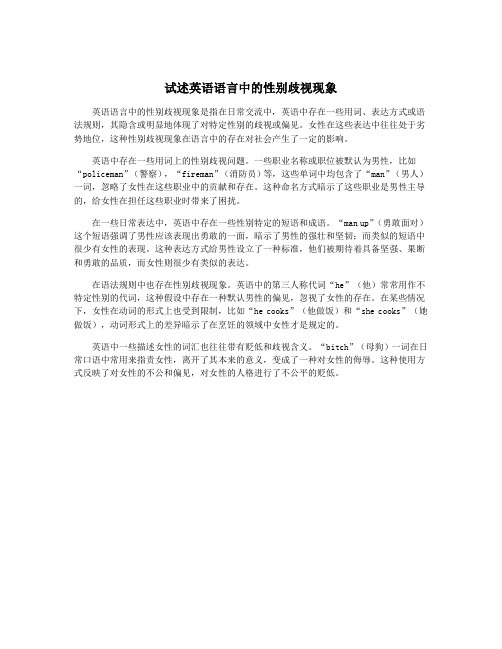
试述英语语言中的性别歧视现象
英语语言中的性别歧视现象是指在日常交流中,英语中存在一些用词、表达方式或语法规则,其隐含或明显地体现了对特定性别的歧视或偏见。
女性在这些表达中往往处于劣势地位,这种性别歧视现象在语言中的存在对社会产生了一定的影响。
英语中存在一些用词上的性别歧视问题。
一些职业名称或职位被默认为男性,比如“policeman”(警察),“fireman”(消防员)等,这些单词中均包含了“man”(男人)一词,忽略了女性在这些职业中的贡献和存在。
这种命名方式暗示了这些职业是男性主导的,给女性在担任这些职业时带来了困扰。
在一些日常表达中,英语中存在一些性别特定的短语和成语。
“man up”(勇敢面对)这个短语强调了男性应该表现出勇敢的一面,暗示了男性的强壮和坚韧;而类似的短语中很少有女性的表现。
这种表达方式给男性设立了一种标准,他们被期待着具备坚强、果断和勇敢的品质,而女性则很少有类似的表达。
在语法规则中也存在性别歧视现象。
英语中的第三人称代词“he”(他)常常用作不特定性别的代词,这种假设中存在一种默认男性的偏见,忽视了女性的存在。
在某些情况下,女性在动词的形式上也受到限制,比如“he cooks”(他做饭)和“she cooks”(她做饭),动词形式上的差异暗示了在烹饪的领域中女性才是规定的。
英语中一些描述女性的词汇也往往带有贬低和歧视含义。
“bitch”(母狗)一词在日常口语中常用来指责女性,离开了其本来的意义,变成了一种对女性的侮辱。
这种使用方式反映了对女性的不公和偏见,对女性的人格进行了不公平的贬低。
试述英语语言中的性别歧视现象

试述英语语言中的性别歧视现象
英语作为世界上最流行的语言之一,也存在着性别歧视现象。
这种歧视在英语中表现
出来的形式多种多样,涉及到语言的用法、发音、文化传统等方面。
首先,英语中的性别歧视表现在语言用法上。
例如,男性职业往往被用于普通的代词
和名词,而女性职业则通常需要添加一个附加词来强调性别。
例如,“男”医生通常被简
称为“医生”,而“女”医生则几乎总是要被称为“女医生”,这种方式给人造成了一种
男性地位高于女性的感觉。
其次,在英语的发音上,也存在性别歧视现象。
例如,由于英语中很多单词和短语含
有“he”或“she”的音素,因此听到相应的词汇时,人们往往会自然而然地与相应的性
别联系起来,并且这种联系体现在听到这些词汇的发音上。
这种现象可能会使得某些女性
在英语语言环境中感到不被尊重或排挤。
此外,英语中的文化传统也会导致性别歧视的现象。
例如,在英语文学、广告、媒体
等方面,男性往往被描绘成活跃、自信、强壮、有责任心的形象,而女性则被描绘为柔弱、依赖、感性和家庭主妇的形象。
这种文化传播对于英语语言中产生性别差异和歧视问题起
到了很大的影响。
总的来说,在英语中存在着性别歧视现象,而这种现象并不能轻易地被消除。
我们需
要进行更深入的研究和教育,以让人们认识到性别歧视的重要性,并努力通过教育和文化
的手段来消除这种歧视。
只有在这样的努力下,英语这样一种世界性的语言才会逐渐拥有
更加平等和包容的语言环境。
试述英语语言中的性别歧视现象
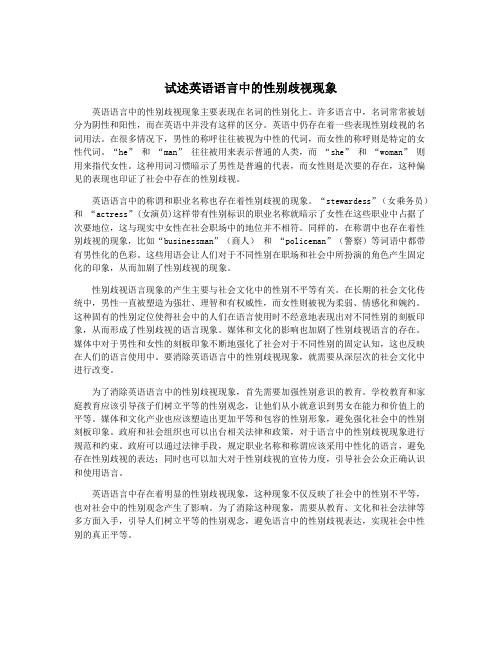
试述英语语言中的性别歧视现象英语语言中的性别歧视现象主要表现在名词的性别化上。
许多语言中,名词常常被划分为阴性和阳性,而在英语中并没有这样的区分。
英语中仍存在着一些表现性别歧视的名词用法。
在很多情况下,男性的称呼往往被视为中性的代词,而女性的称呼则是特定的女性代词。
“he” 和“man” 往往被用来表示普通的人类,而“she” 和“woman” 则用来指代女性。
这种用词习惯暗示了男性是普遍的代表,而女性则是次要的存在,这种偏见的表现也印证了社会中存在的性别歧视。
英语语言中的称谓和职业名称也存在着性别歧视的现象。
“stewardess”(女乘务员)和“actress”(女演员)这样带有性别标识的职业名称就暗示了女性在这些职业中占据了次要地位,这与现实中女性在社会职场中的地位并不相符。
同样的,在称谓中也存在着性别歧视的现象,比如“businessman”(商人)和“policeman”(警察)等词语中都带有男性化的色彩。
这些用语会让人们对于不同性别在职场和社会中所扮演的角色产生固定化的印象,从而加剧了性别歧视的现象。
性别歧视语言现象的产生主要与社会文化中的性别不平等有关。
在长期的社会文化传统中,男性一直被塑造为强壮、理智和有权威性,而女性则被视为柔弱、情感化和婉约。
这种固有的性别定位使得社会中的人们在语言使用时不经意地表现出对不同性别的刻板印象,从而形成了性别歧视的语言现象。
媒体和文化的影响也加剧了性别歧视语言的存在。
媒体中对于男性和女性的刻板印象不断地强化了社会对于不同性别的固定认知,这也反映在人们的语言使用中。
要消除英语语言中的性别歧视现象,就需要从深层次的社会文化中进行改变。
为了消除英语语言中的性别歧视现象,首先需要加强性别意识的教育。
学校教育和家庭教育应该引导孩子们树立平等的性别观念,让他们从小就意识到男女在能力和价值上的平等。
媒体和文化产业也应该塑造出更加平等和包容的性别形象,避免强化社会中的性别刻板印象。
试述英语语言中的性别歧视现象

试述英语语言中的性别歧视现象英语语言中的性别歧视现象是存在的,尽管很多人可能注意不到或者不愿意关注这种问题。
以下是一些常见的性别歧视现象。
首先,英语语言中存在很多单词和短语会暗示某种性别优劣或者性别刻板印象。
例如,“男子汉”通常被视为一种勇敢有力的形象,而“娘娘腔”则被视为某种贬义的形象。
同样的,一些颜色也被赋予了性别价值。
粉色经常被认为是女性的颜色,而蓝色则被视为男性的颜色。
第二,英语中的一些职业名称、动词等词汇也常常存在性别歧视。
例如,“主妇”或“家庭主妇”一词被用来形容女性在家里照顾家庭的角色,而“主人”则被用来形容男性家长。
类似的,动词“nag”(唠叨)通常被人们认为是女性在家庭中的行为,而“command”(命令)则被认为是男性的行为。
第三,英语中的某些词汇或者短语可能会表现出对女性的性别偏见。
例如,“女权主义者”一词被视为贬义词,而“男人”则很少被视为贬义词。
同样的,女性的外貌也被赋予了很高的价值。
例如,女性被认为应该漂亮、苗条、年轻等等。
第四,英语中存在一些固定搭配和成语,可以体现性别歧视。
例如,“man up”(变勇敢)或者“stop being such a girl”(不要像个女孩一样)。
这些搭配和成语所表达的性别刻板印象是不利于促进男女平等的。
总的来说,英语语言中的性别歧视现象普遍存在,而这种歧视终究会对社会和个人产生严重的不利影响。
要解决这个问题,我们需要关注这种现象并采取行动,例如更加警惕地选择词汇、提高对性别平等的认识,以及支持更开放、包容和平等的语言使用方式。
试述英语语言中的性别歧视现象
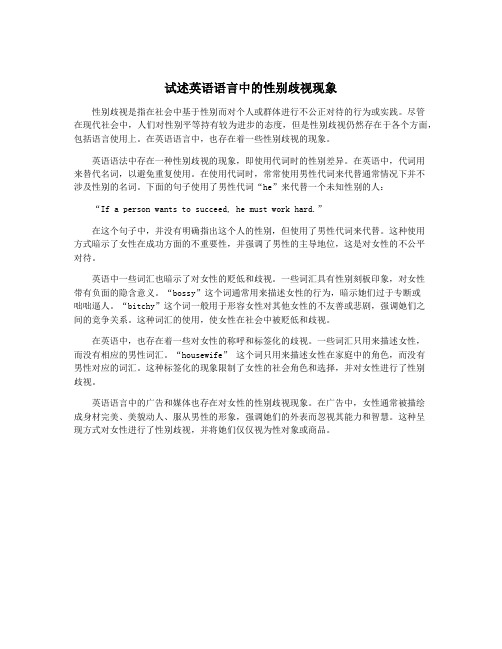
试述英语语言中的性别歧视现象性别歧视是指在社会中基于性别而对个人或群体进行不公正对待的行为或实践。
尽管在现代社会中,人们对性别平等持有较为进步的态度,但是性别歧视仍然存在于各个方面,包括语言使用上。
在英语语言中,也存在着一些性别歧视的现象。
英语语法中存在一种性别歧视的现象,即使用代词时的性别差异。
在英语中,代词用来替代名词,以避免重复使用。
在使用代词时,常常使用男性代词来代替通常情况下并不涉及性别的名词。
下面的句子使用了男性代词“he”来代替一个未知性别的人:“If a person wants to succeed, he must work hard.”在这个句子中,并没有明确指出这个人的性别,但使用了男性代词来代替。
这种使用方式暗示了女性在成功方面的不重要性,并强调了男性的主导地位,这是对女性的不公平对待。
英语中一些词汇也暗示了对女性的贬低和歧视。
一些词汇具有性别刻板印象,对女性带有负面的隐含意义。
“bossy”这个词通常用来描述女性的行为,暗示她们过于专断或咄咄逼人。
“bitchy”这个词一般用于形容女性对其他女性的不友善或悲剧,强调她们之间的竞争关系。
这种词汇的使用,使女性在社会中被贬低和歧视。
在英语中,也存在着一些对女性的称呼和标签化的歧视。
一些词汇只用来描述女性,而没有相应的男性词汇。
“housewife” 这个词只用来描述女性在家庭中的角色,而没有男性对应的词汇。
这种标签化的现象限制了女性的社会角色和选择,并对女性进行了性别歧视。
英语语言中的广告和媒体也存在对女性的性别歧视现象。
在广告中,女性通常被描绘成身材完美、美貌动人、服从男性的形象,强调她们的外表而忽视其能力和智慧。
这种呈现方式对女性进行了性别歧视,并将她们仅仅视为性对象或商品。
试述英语语言中的性别歧视现象
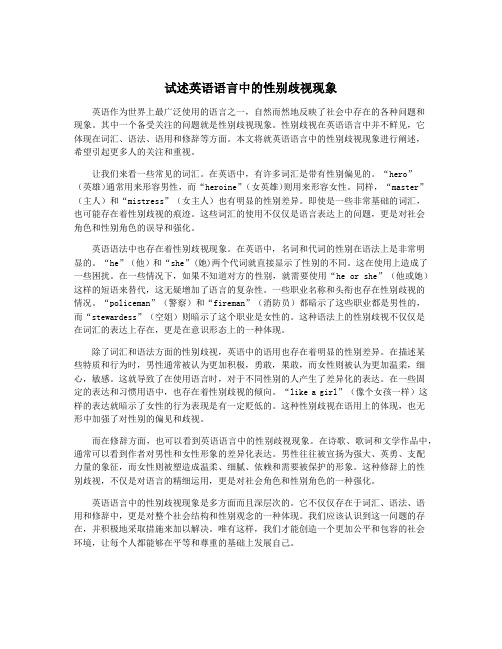
试述英语语言中的性别歧视现象英语作为世界上最广泛使用的语言之一,自然而然地反映了社会中存在的各种问题和现象。
其中一个备受关注的问题就是性别歧视现象。
性别歧视在英语语言中并不鲜见,它体现在词汇、语法、语用和修辞等方面。
本文将就英语语言中的性别歧视现象进行阐述,希望引起更多人的关注和重视。
让我们来看一些常见的词汇。
在英语中,有许多词汇是带有性别偏见的。
“hero”(英雄)通常用来形容男性,而“heroine”(女英雄)则用来形容女性。
同样,“master”(主人)和“mistress”(女主人)也有明显的性别差异。
即使是一些非常基础的词汇,也可能存在着性别歧视的痕迹。
这些词汇的使用不仅仅是语言表达上的问题,更是对社会角色和性别角色的误导和强化。
英语语法中也存在着性别歧视现象。
在英语中,名词和代词的性别在语法上是非常明显的。
“he”(他)和“she”(她)两个代词就直接显示了性别的不同。
这在使用上造成了一些困扰。
在一些情况下,如果不知道对方的性别,就需要使用“he or she”(他或她)这样的短语来替代,这无疑增加了语言的复杂性。
一些职业名称和头衔也存在性别歧视的情况。
“policeman”(警察)和“fireman”(消防员)都暗示了这些职业都是男性的,而“stewardess”(空姐)则暗示了这个职业是女性的。
这种语法上的性别歧视不仅仅是在词汇的表达上存在,更是在意识形态上的一种体现。
除了词汇和语法方面的性别歧视,英语中的语用也存在着明显的性别差异。
在描述某些特质和行为时,男性通常被认为更加积极,勇敢,果敢,而女性则被认为更加温柔,细心,敏感。
这就导致了在使用语言时,对于不同性别的人产生了差异化的表达。
在一些固定的表达和习惯用语中,也存在着性别歧视的倾向。
“like a girl”(像个女孩一样)这样的表达就暗示了女性的行为表现是有一定贬低的。
这种性别歧视在语用上的体现,也无形中加强了对性别的偏见和歧视。
试述英语语言中的性别歧视现象

试述英语语言中的性别歧视现象性别歧视是指在社会中因性别而受到不公平待遇或歧视的现象。
在英语语言中,也有许多与性别有关的歧视现象。
本文将重点探讨英语语言中的性别歧视现象。
首先,一些职业名词在英语中存在着性别歧视。
例如,很多人在想到吸氧呼吸器时,第一反应可能是“氧气面罩”,而不是“氧气口罩”,这就是因为“面罩”在英语中通常被认为是指女性所佩戴的化妆品,而“口罩”则被认为更加中性。
同样,职业名称中也存在性别偏见。
“警察”一词无论是在口语中还是在文学作品中,都普遍被认为是指男性。
事实上,警局早已接纳了女性警察的存在。
其次,英语中许多词汇也存在着性别歧视。
在描述性别特征的形容词中,“manly”(男子气概的),“womanly”(女子气质的)等词汇都通常只用来描述男性或女性。
同样,“he”和“she”一词也带有性别标记,不能用来表达中性或与性别无关的事物。
除此之外,在描述性行为和性对象时,“promiscuous”(通奸的)等负面词汇通常被用来指女性,而“virile”(男子气概的)等被用来指男性。
再次,英语语言中也存在着体现性别偏见的习语。
例如,“rule the roost”(掌管家务),其实在过去的时代中,这一职责都是由女性承担的,但是这一习语却倾向于“主宰”这一职责由男性承担。
同样,在英语中,“like a girl”这一习语常常被用来讽刺某个行为或个人,而这恰恰表明了女性在英语语境中的弱势地位。
总之,英语语言中的性别歧视现象不容忽视。
为了消除这种歧视,我们应该通过语言的使用来创造一个更加平等和包容的社会环境。
试述英语语言中的性别歧视现象

试述英语语言中的性别歧视现象
英语语言中存在着性别歧视现象,表现在词汇、语法和表达方式等多个方面。
性别歧视也体现在英语语法中。
在第三人称单数代词中,he(他)常常被用作通用的
代词,即使指代的是男女都有的事物。
这使得女性在表达中更容易被忽视或缺席,反映了
对于男性的优先性和女性的较低地位。
类似地,许多动词和形容词都有男性和女性的形式,如manly(男性特征的)和womanly(女性特征的)。
这种语言上的划分也给人们灌输了一种对于“男性气质”的推崇,而对于“女性气质”的贬低。
英语中一些习语和成语也充斥着性别歧视。
“throw like a girl”(像女孩子扔东西)这种说法暗示女性体力较弱,低估了女性的潜力。
再如,“boys will be boys”(男孩就是男孩)这句成语暗指男性有些冲动、粗鲁的行为是可以被接受的,而女性则被要求更为
收敛和规矩。
这些成语和习语都在潜移默化中强化了性别刻板印象,对于男女的期待和评
价有着明显的偏见。
英语语言中存在着性别歧视现象,这体现在词汇、语法和表达方式等多个方面。
这些
偏见和歧视对于社会的性别平等产生了负面影响,需要我们关注和反思,努力消除性别歧视,实现性别平等。
试述英语语言中的性别歧视现象

试述英语语言中的性别歧视现象1. 引言1.1 性别歧视的定义性别歧视是指基于性别或性别认同而产生的不公平对待或偏见。
这种不平等对待通常是由社会、文化或制度性因素造成的,导致对特定性别的人或群体进行歧视、排斥或限制他们的权利和机会。
性别歧视不仅限制了个人的发展和自由,也损害了整个社会的平等和公正。
在英语语言中,性别歧视也是普遍存在的现象。
这种现象体现在英语词汇、语法结构和语言习惯中。
一些特定的职业名称在英语中被默认为男性或女性,导致了对不同性别从事特定职业的偏见。
一些动词和形容词也存在着明显的性别偏见,如将男性与积极、有力或有能力联系在一起,而将女性与消极、软弱或无能联系在一起。
性别歧视在英语语言中的存在不仅影响了个体的自我认同和社会地位,也对整个社会的性别平等和公正构成了挑战。
我们需要更加关注和认识英语语言中的性别歧视问题,并采取积极的措施来消除这种现象,促进性别平等和社会公正。
1.2 英语语言中的性别歧视Gender discrimination in the English language is a pervasive issue that reflects and perpetuates societal gender biases. From the way we address individuals to the words we use to describegender roles, language plays a powerful role in reinforcing stereotypes and inequalities between men and women.2. 正文2.1 语言中的性别偏见语言中的性别偏见是指对不同性别的人在语言使用中存在偏向或偏见。
这种偏见可能体现在词汇选择、句法结构、语气和声调等方面。
在英语语言中,常见的性别偏见表现包括对男性视为默认或普遍代表,而女性则被视为特例或次要代表。
试述英语语言中的性别歧视现象

试述英语语言中的性别歧视现象英语是全球通用的语言之一,然而在英语语言中,性别歧视现象依然存在。
性别歧视是指基于性别对个体或群体进行不公平对待或给予特别优待的现象。
性别歧视在语言中表现为对男性和女性采用不同的称呼、用词和语法结构等方面,反映了社会对性别角色的刻板印象和偏见。
本文将试述英语语言中的性别歧视现象,并探讨如何消除这些不平等对待。
在英语语言中,性别歧视表现为对男女性别采取不同的称呼。
通常情况下,男性的称呼更多样化,如“sir”, “mister”, “gentleman”, 而女性的称呼只有“miss”或“mrs”,没有相应的称呼像男性一样多元。
这种情况反映了对男性称呼的尊重和尊重,而对女性称呼的简化和单一化,这可能会在潜移默化中影响对男女性别的认知和对待。
性别歧视还在英语语言中体现为用词的不平等对待。
比如“master”一词用于男性称呼,而“mistress”则被用于女性称呼,这体现了对男女性别的不平等对待。
同样,英语中有一些词语在男女性别中有不同的含义,如“bossy”一词常用来形容女性,而“assertive”则用于男性,这种双重标准也反映了对男女性别的不公平对待。
在英语语言的语法结构中也存在性别歧视现象。
在一些情况下,英语语法结构中的代词和形容词会根据性别的不同而有所变化。
比如“he”和“she”、“his”和“hers”,“man” 和“woman”等,这些词汇的不同变形也反映了对男女性别的不平等对待。
性别歧视在英语语言中的存在,不仅仅是对具体的语言表达形式的偏见,更是对于整个社会对于男女角色和期望的一种延续。
这种对于性别的不平等对待,不仅仅在语言中存在,在社会的方方面面都有所体现,而语言作为社会交流的一种方式,更是将这种歧视延续和传递的一种方式。
为了消除英语语言中的性别歧视现象,我们需要从多个方面着手。
教育机构应该在教学中注重性别平等教育,教导学生尊重性别差异,消除性别歧视的观念。
试述英语语言中的性别歧视现象

试述英语语言中的性别歧视现象在英语语言中存在着一些性别歧视的现象,这种歧视往往体现在对男女性别的称呼、表达方式、词汇选择等方面。
虽然在现代社会中已经有了很多对性别歧视的反对和改变,但是在语言中的性别歧视现象依然存在,需要引起我们的重视和关注。
英语语言中存在着一些针对女性的歧视称呼。
在很多情况下,人们会用一些带有贬义的词汇来形容女性,比如"bitch"、"slut"、"whore"等词汇。
这些词汇不仅在口头语言中被使用,而且在文学作品、音乐歌曲等媒体中也能听到,这种现象就是对女性的一种侮辱和歧视。
即使不是带有贬义的词汇,一些称呼也可能存在着性别歧视的成分,比如对女性称呼为"女士"或"太太",而对男性称呼为"先生"。
这种称呼方式很容易让人觉得女性地位低于男性,存在着一种隐性的性别歧视。
英语语言中的一些词汇选择也表现出了性别歧视的现象。
比如在一些职业名称中,往往会出现男性化的形式,比如"policeman"、"fireman"等,而女性从业者则要用"policewoman"、"firewoman"这样的词汇来表示。
这种词汇选择会使人们在心理上产生一种认为这些职业适合男性从事的偏见,从而使女性在职业选择上受到了限制。
在一些成语、俗语中也存在着性别歧视的现象,比如"man's world"、"boys will be boys"等俗语在一定程度上暗示了男性的优越性,从而排斥了女性的存在和地位。
试述英语语言中的性别歧视现象

试述英语语言中的性别歧视现象性别歧视是指因为一个人的性别而对其进行不公平对待的现象。
在英语语言中,性别歧视的现象也是普遍存在的。
这种现象可能体现在词汇、语法和语用上。
本文将试述英语语言中的性别歧视现象,并探讨如何消除这些现象。
英语语言中的语法结构也存在着性别歧视现象。
使用“he”(他)作为普遍性别代词,而忽略了“she”(她)的存在。
在很多情况下,人们可能也会使用“man”(男人)作为泛指,而不是使用更中性的术语。
这种语法上的性别歧视也会巩固人们对于性别的刻板印象,让人们产生误以为男性是普遍性的代表的偏见。
英语语言中的语用也存在着性别歧视现象。
在交流中,人们可能不经意地使用了一些带有性别偏见的语言。
称赞女性时可能会聚焦在外貌而非能力,或者当女性表现出强硬的态度时可能会被贴上“女汉子”的标签。
这种语用上的性别歧视也会进一步强化人们对性别的偏见和刻板印象。
那么,如何消除英语语言中的性别歧视现象呢?我们可以通过修正词汇来消除性别暗示。
将“policeman”和“fireman”改为“police officer”(警官)和“firefighter”(消防员)来避免性别的暗示。
我们可以通过使用更中性的代词和语法结构来减少性别歧视。
使用“they”(他们/她们)来替代“he”或“she”,同时也可以使用“humankind”(人类)来替代“mankind”(人类)等。
我们也可以通过教育和倡导来改变人们对于性别的刻板印象,引导人们更加理性地看待性别。
英语语言中的性别歧视现象是普遍存在的。
这种现象体现在词汇、语法和语用上,带来了对于性别的印象和偏见。
我们可以通过修正词汇、使用更中性的代词和语法,以及通过教育和倡导来消除这些现象。
让我们共同努力,消除英语语言中的性别歧视,创造一个更加平等和和谐的社会。
【2000字】。
试述英语语言中的性别歧视现象

试述英语语言中的性别歧视现象英语语言中的性别歧视现象在很多方面都存在着,而这些歧视往往会影响到人们的思维和行为。
在英语的词汇和语法中,性别歧视表现得深入人心,很多时候我们甚至没有意识到这些歧视现象对我们的影响。
除了词汇上的性别歧视外,英语语法中也存在着明显的性别歧视现象。
在一些情况下,英语语法中的第三人称代词和称谓代词都暗含着性别歧视。
“he”通常用来指代男性,“she”则用来指代女性,“his”用来指代男性所有格,“her”则用来指代女性所有格。
而在一些情况下,当我们不清楚对方的性别时,我们往往会使用“he”来代替中性代词,“man”来代替人类等等,这些都暗示了男性在语言和社会中的主导地位。
除了词汇和语法上的性别歧视外,英语语言中的谚语、俗语和成语中也包含着性别歧视的成分。
比如“man up”、“act like a man”等俗语都暗示了男性的强壮和男子气概,“crying like a girl”则暗示了女性的软弱和无力。
这些俗语和成语在无形中强化了对男性和女性的刻板印象,对人们的性别认知产生了消极影响。
面对英语语言中的性别歧视现象,我们应该怎么办?我们要意识到性别歧视的问题,意识到语言中的歧视现象对我们的思维和行为所产生的影响。
我们要尽量避免使用含有性别歧视的词汇和语法,例如使用中性代词代替男性或女性,使用中性词汇代替男性专属的职业名称等等。
我们要从学校教育开始,教育我们的下一代注重性别平等,不应该受到语言中的性别歧视影响,而应该在思维和行为中秉持平等的态度。
英语语言中的性别歧视现象是一个长期存在的问题,它不仅仅局限于词汇和语法,更影响了我们的社会观念和认知方式,使得我们对性别问题的认知和态度产生了偏见。
我们要从语言使用习惯开始,努力消除语言中的性别歧视现象,促进性别平等的社会氛围。
让我们携手努力,为创造一个平等、包容的社会而努力奋斗吧!。
[英语,性别,现象]英语语言文化中的性别歧视现象及其规避
![[英语,性别,现象]英语语言文化中的性别歧视现象及其规避](https://img.taocdn.com/s3/m/52d969c46c175f0e7dd1372f.png)
英语语言文化中的性别歧视现象及其规避语言作为文化的一项载体,体现出了一定时期内人们的思维方式、习俗以及社会文化。
然而,在这个特殊的过程中,一些性别歧视也逐渐从语言中呈现了出来。
在性别歧视中,往往将男性放在一个主体和中心地位,对女性则是歧视和侮辱的成分较多。
一、英语语言中性别歧视的表现形式1.称谓中的性别歧视现象。
在英语文化中,女性的称谓通常是在依靠男性的基础上形成的。
如尊称一位男性的时候,通常说Mr,而称男子的妻子为Mrs,所以很多时候只要通过女性的名字就可以判断她是否结婚,而男性却没有办法确定。
并且经过长时间的名称改变,很多时候女性都会遗忘掉自身最开始的姓。
2.词汇中的性别歧视现象。
在英语语言文化中,一些词汇也非常直接的体现出了男性和女性之间的差别,比如有些词汇可以用来形容一个男性,但是形容一个女性则是不可以的,如virile(刚健的)。
另外,在英语语言当中,有很多词汇的词根不仅是以男性为主,同时这些词汇还可以用来代表整个男女集体,而将这些词根进行演化之后就可以用来代表女性。
3.语义中的性别歧视现象。
通过对英语语言的研究发现,在大量的英语词汇中,用于对男性的形容词汇通常都是褒义和积极的,而用来形容女性的词汇多数则是贬义的,即便是之前有一定的褒义,但是随着时间的推进,很多对女性的用词基本上都演变为了具有一定贬义性的词汇。
比如wench一词,在过去的时代里,wench一词仅仅指的是一般姑娘或者村里来的姑娘,但是进过时间的推演,现在却成了娼妓和荡妇的代名词了。
4.谚语中的性别歧视现象。
下面的谚语集中反映了妇女受欺凌、歧视的社会地位。
如:A man of straw is worth of a woman of gold.(稻草男儿抵得上金玉女子)。
Women have long hair and short brains.(女人头发长,见识短)。
Many women,many words; Many geese,many turds.(鹅的屎多,女人的话多)。
试论英语中的性别歧视现象

而如果我们知道一位女性还未婚, 则用不同的称谓 Mi 。 s 也就是说, s 对于男性来说,从称呼中我们看不出其婚姻状况,但女性的称谓却 语言与性别的关系是社会语言学的一个重要研究方向, 0世 目了然,这一点本身就说明了男女性称谓反映出其在社会上的不 从2 纪6 0年代开始,国内外学者从不同角度对语言中的性别差异进行 平等状况,男性可以以统一的称呼保留一定的隐私,但女性就必须 了系统科学的研究,性别语言差异已成为社会语言学研究的一项重 完全袒露自己的婚姻状况。同时,我们也看到 Mr . 是对一位男子的 要内容。2 O世纪 7 O年代中期以来,社会语言学中的性别歧视成为 尊称,而 Mr则是对一位男子的妻子的尊称,女人离不开男人,她 s . 许多人关注的对象。这里将主要探讨英语中的性别歧视。 们不过是男性的附席,这同样表明在社会中对于男性的尊重远胜于 英语 的性别歧视 女性。 英语中充斥着性别歧视语,虽然近年来也有人对于性别歧视也 另外,大部分表示男女 的词语以男先女后的顺序排列 ,如 u b n n f o s i , O a g tr r te i r e a l n n t 有对男性的语言歧视现象展开过讨论,但我们不得不承认对于女性 h s a da dwi ,b y ndgrs S Da dd u h e ,b oh ra dsse , 的性别歧视更为典型和普遍。这里我们以英语为例,分三点更为具 f hr n o e a ead t r t m h 。如果我们把这些词的顺序颠倒过来,就不符合英 体地来谈性别歧视在社会中的表现。 语的语言习惯了。 这说明男尊女卑是一种普遍的现象, 而特例“ai le ds 1重男轻女。这一特点很典型地表现在取名以及称呼上。从取 adgnl n . n etme”仅是社交场合中常用的客套话,源于把女子看做弱 e 名字上我们能很清楚地看到重男轻女的社会特点。在男权社会中, 者 ,需 要男子扶 助。 男性才是家庭的重心,血统、亲属关系和头衔都是以男性为主。家 2忽视女性。男性词如通性名词 ma 和人身代词 h . n e的范化是 庭中只有男孩才能以父亲的名字命名,如 H n od I er Fr 沿用了父亲 忽视女性的存在的显著表现。 y I 英语语言以男性为规范, 把男性的语 H n od er F r 的名字,而女性婚前随父姓,婚后随夫姓,似乎她们本 言作为标准和主体,处于统治地位的是男性的语言 ( y 公共场合语) , 身只不过是一个附属,并无男性那股在家庭以及社会当中有着无可 而女性语言 ( 私人场合语)只是一种附属和变体。英语本身没有性 替代的作用。 (edr gne)的区别,许多职业名称,如 dc r 医生) poesr 教 ot ( o 、 rfs ( o 重男轻女的现象从称谓中也能看出端倪。我们都知道,在正式 授)等对男女都适用,可是人们却总习惯于将它们与男性联系在一
- 1、下载文档前请自行甄别文档内容的完整性,平台不提供额外的编辑、内容补充、找答案等附加服务。
- 2、"仅部分预览"的文档,不可在线预览部分如存在完整性等问题,可反馈申请退款(可完整预览的文档不适用该条件!)。
- 3、如文档侵犯您的权益,请联系客服反馈,我们会尽快为您处理(人工客服工作时间:9:00-18:30)。
论英语中的性别歧视现象及其消除方法[Abstract]Language reflects a nation’s history, culture and all of its entertainments, believes and prejudice. Therefore, language inevitably has the traits of sexism. It is the use of language which devalues members of one sex, almost invariably women, and thus fosters gender inequality. It discriminates against women by rendering them invisible or trivializing them at the same time that it perpetuates notions of male supremacy. This thesis is to talk about the sexual discriminations in English, traits of female language, and solutions to eliminate sexual discriminations.[Key words]English,sexual discrimination,female language,solutionI. Sexual Discrimination in English1.1 Take the men’s language as the standard language, and women as the ancilla of menIn English, there are many words with sexual discrimination phenomenon, and in the order of words, we can find that men are usually in front of women. For instance, Mr. and Mrs., his and hers, boys and girls, men and women, brothers and sisters, etc.. Because of the long-term historical reason, women have been put in the position of appurtenant of men. In many countries there is the tradition that unmarried women arenamed after their fathers, after their marriage, they are named after their husbands. In English, compared with men’s names, women’s names are slighting and they will always be called their husbands’family names, like Mrs. Smith. And in some paratactic phrases, women are always in the number two place, for example, King and Queen, Lord and Lady, husband and wife, and etc.. The phenomenon that considers women as the appurtenant of men can also be found in the word-building of some conjugated words, like prince —princess, host —hostess, mister —mistress, male — female, man — woman, hero — heroine, etc.. In these words, we can find that those words of men are not tagged while those of women are formed by adding additive morpheme.1.2 Take women as the exceptionIn English, there are many words that are “ruled” by men, like chairman, spokesman, freshman, brotherhood, etc.. Psychologically, people think that those reputable persons must be men, so once women become reputable, they will be considered as the exception. Most people (including women) will connect president, chancellor, professor, judge, and lawyer with men when they are mentioned, so in order to avoid misunderstanding, people will add the tag “woman” to those titles which will be given to women, such as woman doctor, female pilot, etc.. In English, man and woman is a couple of conjugated words. But the word“man” can not only refer to male adult but a lso all the human beings, while the word “woman” can only refer to female adult. And this also relates to the phenomenon that people consider men’s language as the standard one while the women’s language as the variation. If a word seemingly has only the character of men, then actually the word can be used to say both sexes, which is also a representation of men centered phenomenon. For example, in English, there are many words which refer to occupations end with “-man”, like fisherman, policeman, sportsman, fireman, and so on. Due to the suffix “-man”, people will connect people who do these jobs with men, but these words can also refer to the women who do the jobs.1.3 The third personal pronouns in use are likely to ignore women“He” can be used to mean a person whose sex is not known or anyone, as: Everyone should do what he thinks best. Though women occupy more than 50% in the world’s population, according to a Stat. the proportion of the use of “he” and “she” in literature is 4:1.1.4 Female words tend to be derogatory sense while male words are on the contraryHere are some examples of the words that are often used in couples: man / woman → prostituteking / queen → she-catlord/ lady → inamorata or ladylovemaster/ mistress → inamorataDifferent with these female words, male words tend to be commendatory. Words like man, king, lord, and master are considered as the eulogistic words, and if the first letters are capitalized, these words can refer to “God” or “Jesus”.In English, when some words are used to modify men, their meanings are positive, but if they are used to refer to women, their meanings are usually awful. Here are some examples:Tommy is easy. (He is easygoing and kind to people.)Barbara is easy. (She is wanton.)Matthew is cold. (He is disimpassioned and calm.)Helen is cold. (She is dissocial.)Edward is fast. (He dose things quickly and neatly.)Mary is fast. (It is easy to woo her love.)Philip is a pro. (He is a professional talent.)Jessica is a pro. (She is a prostitute.)Carter is a tramp. (He is a stroller.)Amy is a tramp. (She is a harlot.)Mike is loose. (He is lax in discipline.)Sally is loose. (She is profligate.)A call boy (a waiter in the hotel or a workman who call the actors and actresses to be on stage)A call girl (the prostitute who are called through telephone)Ⅱ. Traits of Female LanguageMany spectators think that languages used by male and female are different in many aspects, like in intercommunication. Female language is a very common phenomenon existing in every language in the world. Female and male will choose different ways to express themselves while giving voice to their thoughts in the same language. Women are educated to talk in gentle intonation; never defense others; be docile and modest while communicating; avoid giving any arbitrary opinions; and beware of self-complacence. Therefore the traits of female language can be summarized in the following aspects: word select; grammar select; and pronunciation and intonation.2.1 Word selectBoth sexes have their preference in word select, or we can say that a large amount of words are marked with either “feminine” or “masculine”. Male will not or think it scorn to use the words that are proper in female language, or in other words, the “feminine” words; in the same way, those “masculine” word are taboo to women. Women always express their feelings without any hesitations, and they like to talk in an exaggerated way, so their word select have the following traits:1. Women like to use the grandiloquent words, as “cute, divine, charming, gorgeous, and heaven ly” and so on. Of cause men sometimes also use these words, but according to the tradition, they seldom use these words to mean the same things. Sentences as “What a divine idea!” and “It’s a gorgeous meal.” are obviously spoken by women.2. Women will more often use those adverbs which have ascensive functions, as well as those adverbs which strengthen adjectives. For example, “so, such, quite, terribly” etc. Lakoff (1972) and Tarone (1979) proved that, men prefer using “very” and “really” in their interco mmunication while women prefer using “so”.3. Women are good at using some words of colors, especially those words which are seldom used by people, like “mauve, beige, lavender,magenta, taupe, aquamarine, azure” etc.4. Women like to add “-y” or “-ie” t o the end of some words or titles in order to denote the meanings of “small or little” or “intimate”, like “auntie, bookie, dearie, Jackie, Billy” etc. On the contrary, male adults will be laughed at if they use these words in the public.5. Women seldom use execrative language but interjections. Women pay more attention to the grace and connotation of their language and try their best to avoid using the vulgarity language, as “shit, damn, hell”, compared to these, they would like to use some interjections or phrases that are more gentle and implicative, like “Oh, dear.”; “My God.”; “My Goodness”; “Oops.”; and “Heavens”, etc.6. Women usually use nice Nelly to substitute those expressions that are unpleasant or disrespected. For example:Babara: What do you think of the color of my coat?Nancy: It’s interesting.7. Women use more polite formulas, “Thank you”, “please”, “You are so kind.”, “thanks”, etc.2.2 Grammar selectIn English there is no regulation saying that some certain grammarpatterns are only for women use. In grammar select, not like in word select, female language dose not have obvious traits, but those traits can still show the linguistic difference of both sexes. Women often use the grammar patterns as followed:1. Disjunctive questionWomen always add disjunctive question to the end of some statements so as to show their politeness, circumbendibus, and connotation. When they express their thoughts, they seldom adopt the direct way. They will not say “He can’t do that.” But say “He can not do that, can he?”. And the nurse will always say that, “We’re going to have our temperature taken, aren’t we?”2. Equivocal sentence and subjunctive sentenceWomen often use equivocal sentences to express their reverence and politeness to the listeners. For instance, nursery maid often use the sentence pattern: “we are going to take our snap now or go right to sleep”. Women would always try to obviate the direct order or request when they are having conversation. For example, when they want to have their husb and to wash the dishes they will say: “Wouldn’t you like to wash the dishes?” And when a house wife has had the lunch ready, due to her reverence and her culture, she will not say to her husband that, “Dinner’sready. Let’s eat.” But she will say: “Would you like to eat now?” or “Wouldn’t you like to eat now? It appears to me.” This sentence pattern emphasize particularly on the uncertainty of what the female speaker will talk about later or not to talk about directly because of some reasons. By using this sentence pattern, women think that they can decrease or eliminate the embarrassment may occur in conversation.3. Adjustive structureUsing the adjustive structure, which is very inobtrusive and polite, can not only show the tentative request and suggestion, but also obviate to answer questions directly. For example they would like to use some jook words, like I suppose, I think, I guess etc. and some modifiers that are less affirmative and cryptic, like probably, possibly, sort of, kind of and so on. This mood also reflects women’s characteristic traits that are less self-confident and decisive than men.4. Standard syntaxWomen are more conscious than men to use the standard syntax. For instance, women seldom use nonstandard multi-ply negative, as “I don’t want none.” According to a survey in Detroit, men occupy the most proportion of using the nonstandard multi-ply negative compared with women. Besides there are less nonstandard words in female language. Forexample the nonstandard sentence “Are you comin?” will often be found in male language, while women will use the standard sentence “Are you coming?”2.3 Pronunciation and intonationThere are differences in pronunciation and intonation in the languages spoken by men and women. The reasons of this are from both factors of formation of voice and social factors. There is a common fact that women’s pronunciation is more standard, and closer to “standard language”. According to Trugill and Fisher’s research, the great mass of men (about 62.2%) pronounce “-ing” as front nasal sound /in/, while there are only 28% of women do that.Women’intonation is more variational and expressive than men’s. Generally speaking, in order to show their respect and to create a comfortable phenomenon for conversation, when using sentence of the presentation mood, women would like to use rising tone to express their certainty, unlike men who would like to use the falling tone that is affirmative and unshaken. This is probably because that, compared with men, women dare not to show their determined and positive attitudes. For instance,Husband: When will dinner be ready?Wife: Oh… around six o’clock? ↗Though the wife is sure about the time when dinner will be ready, she would like to use the rising tone to answer her husband to show her uncertainty and fear.And another example is that a lady bought a new car, and she didn’t know how others thought of her car, then she would ask like this: Lady: I bought a new car yesterday.Man: What color is your new car?Lady: White.↗When she told the man the color of her new car she used the rising tone because she was not sure if the color was good or not and she wanted to know the man’s view of her car.Ⅲ. Solutions to Eliminate Sexual Discrimination in EnglishAs the development of the society and the improvement of the status of women in society, in the early 1970s, the women’s rights movement sprang up. Due to its influence, the English world has started a character revolutionary movement which aimed at eliminating the sexual discrimination in English language. In this movement, there was some non-sexist words were created and accepted by people. The solutions toeliminate the sexual discrimination in English are as the following:1. Avoid using words like man/men or mankind to refer to human or people. We should use those neuter words, like people, person, humanity, humankind, human, human being, human race, etc. For example,(1) All men are equal in the eyes of the law.→ All people are equal in the eyes of the law.(2) China ought to make great contribution to mankind.→ China ought to make great contribution to humankind/ humanity.2. Avoid using those compound words that are consisted of the word “men” to refer to both sexes. If the person’s sex is already known, we should use the compound words that are consisted of “man” to refer to man, and use the compound words that are consisted of “woman” to refer to woman, like businesswoman, chairwoman, policewoman, saleswoman, spokeswoman, etc. If the person’s sex is not known yet, we should use those neuter words to substitute the words “man” or “woman”, like businessman→ business person, (plural form) business people. And we could use some non-sexist words to replace some words that haven’t the postfix “-wom an”. For example, fireman→fire fighter, newsman→ news reporter.3. Avoid using the postfix “-ess” or the prepositive modifier “woman”, “lady” or “madam” to lay stress on sex. We should use the neuter words, for example, actress→ actor, authoress→ author, w oman teacher→ teacher.If the person’s sex must be clarified, we’d better use male and female, and better use them in couple. For example, It was a woman driver who sent me home.→ It was a female driver who send me home.3.4 Avoid using he, him or his to refer to both sexes. We should use the terms he or she, him or her, and his or her to substitute that. For example,(1) If a person breaks the law, he will be punished.→ If a person breaks the law, he or she will be punished.(2) A good student should fin ish his homework on time. → A good student should finish his or her homework on time.(3) You must know your friend’s needs before you give him help. → You must know your friend’s needs before you give him or her help.5. When we give examples, we should pay attention to those roles that have already been clung with sexes by people. For example, when we want to give examples of scientists, politicians, and philosophers, we willnaturally give an example of a man, or directly start the example with the word “he”. Similarly, when we mention nurse, secretary, or teacher, we will give examples of women, or begin the example with the word “she”. To this situation, we can do like the following,(1) the politician … he…→ the politicians … they…(2) the nurse … she… → the nurses … they…(3) Research scientists often neglect their wives and children.→ Research scientists often neglect their families.6. Do not introduce a woman through her husband. For example, Robert Jones and his wife Mary, or President’s wife Helen Blake.7. Repeat the title or appellation or use appropriate noun or synonym to substitute pronoun. For example,See your doctor first, and he will explain the prescription.→ Se e your doctor first, and the doctor will explain the prescription.8. Avoid using the appellations that discriminate women, like the better half, the little woman, the weaker sex, the fair sex, etc. Try not to use the sayings with traditional bias, such as ambitious men and aggressive women, cautious men and timid women, etc. And try not touse words like womanly, manly, feminine, which are well related with the characteristics of sexes.9. In letters, to those people that we don’t know or not familiar with, we could use their title of a technical post to avoid mistakes. For example,Dear Madam→ Dear ResidentDear Miss→ Dear Ms.Dear Mrs.→ Dear Ms.10. To idioms, we also need to use those neuter words to replace some sexual discriminative words. For example,Be one’s own man.→ Be one’s own person.Good will to Men. → Good will to All.Ⅳ. ConclusionThere are sexual discriminations in English. Language is a production of history, and sexism in language is the remains of history which could not be easily changed completely. But it is necessary and important for us to find out the sexual discriminations in language and know how they will affect our concept and culture so as to build a moreequal society.【References 】[1]任静生.英语中的性歧视问题及其对策简析[J].合肥工业大学学报(社科版),2000(1).[2] 李红艳.论英语中女性语言的特点和对女性的语言性别歧视现象[J].中山大学研究生学刊(社会科学版),2005,26(2).[3] 杨永林.社会语言学研究:功能称谓性别篇[M].上海外语教育出版社,2004.[4] 代新黎.论英语中的“性别歧视”和规避策略[J].商丘师范学院学报,2005(12).[5] 穆凤良,李秀萍.英语中的性歧视与中性化[J].外语与外语教学,1998(5).[6] 邓红霞.英汉两种语言中的性别歧视现象[J].湖南大学学报,2002(2).[7] Stuart C. Poole. 2000. An Introduction to Linguistics [M].Foreign Language Teaching and Research Press & Macmillan Publishers Ltd.[摘要]语言往往映射着一个民族的历史、文化及其娱乐、信仰和偏见。
